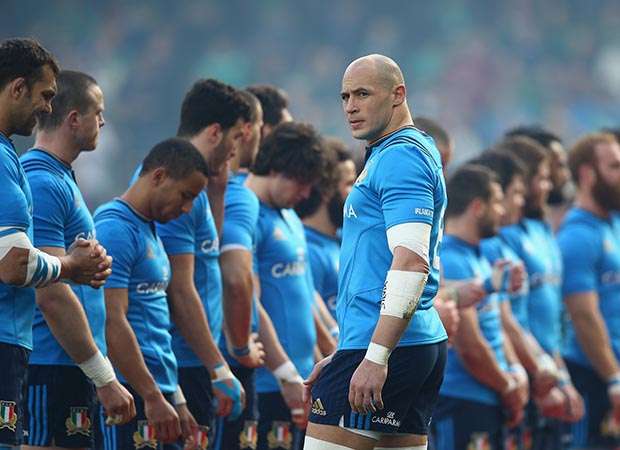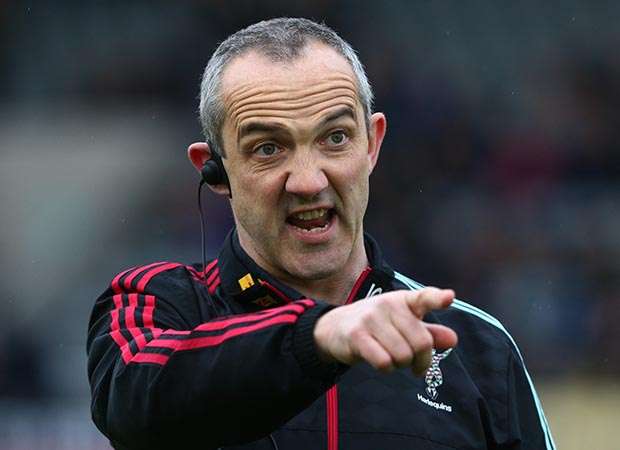 The great Sergio Parisse, and I use the word in its truest sense, was visibly outraged last week when the vultures circled looking to pick over the bones of another poor Six Nations tournament from his side. Inevitably the subject of relegation came up and Parisse railed against those who only ever mention relegation when Italy finish bottom of the pile. When Scotland, Wales or France take the wooden spoon the silence is deafening.
The great Sergio Parisse, and I use the word in its truest sense, was visibly outraged last week when the vultures circled looking to pick over the bones of another poor Six Nations tournament from his side. Inevitably the subject of relegation came up and Parisse railed against those who only ever mention relegation when Italy finish bottom of the pile. When Scotland, Wales or France take the wooden spoon the silence is deafening.
It was understandable that Parisse rejected those self-serving attitudes. But the Italian skipper is wrong to dismiss, or even fear, the prospect of relegation being introduced at some stage. Promotion and relegation will happen one day because the suits are running out of excuses for blocking it.
Most continental European teams, for over a century or more, have been locked out of mainstream European competition by the Five and then Six Nations – commercial organisations – and that is not sustainable anymore if the game wants to grow. It's a miracle in fact that any sort of Test rugby is being played on Continental Europe.
If perennial European Nations champions Georgia – six on the trot now – have just one bad season they will be relegated to EN2 yet there is zero possibility of progressing and bettering themselves. Or even testing themselves at that next European level. It would be difficult to think of a bigger disincentive for the ambitions teams and nations. It's the equivalent of UEFA inviting the same six nations to the European Nations Soccer Cup every four years. Completely undemocratic and possibly even illegal.
Parisse is also on dodgy ground dismissing the quality of the Georgia team – currently ranked 12 in the world to Italy's 14 – by emphasising Italy's splendid wins over Wales, Ireland, Scotand and France during their 17 years in the Six Nations. They have to count for something surely he says?
Well, yes and no. Since their elevation to Six Nations status in 2000 Italy have played well over 100 Tests against T1 opposition outside of the World Cup. Meanwhile, of the 152 Tests Georgia have played in the 21st century, the only time they have been allowed to play a Tier One nation, outside of a World Cup, was Argentina in 2013 and Ireland two years ago. That hardly constitutes a level playing field. What matters is that if Italy and Georgia staged a two- legged play-off this week and next I and many others would be surprised if Georgia didn't win.
Italy enjoyed the massive support and encouragement of Vernon Pugh when he was IRB chariman and the result was regular fixtures with the Five Nations team every season, a rare moment of enlightenment from that organisation. The Georgians, however, have been kept firmly at arm's length by the Home Unions and France with the cosy club seemingly irritated by the Lelos' ability to endure and improve.
Meanwhile, one or two painful home truths need to be uttered about Italian rugby in 2016 and as a massive supporter of long standing I am willing to utter those harsh words if others prefer to stay mute. Italy are regressing and in an alarming fashion on all fronts. They are a million miles away from the take-off that once seems possible. They could, and should, have been the Pumas of European rugby.
Veteran Italian rugby journalist and RAI newshound Paolo Pacitti has rarely been so dispirited: “It is a bad time, the building is crumbling into ruins. Italian rugby must rediscover itself and remember what made it strong and competitive 20 years ago and briefly at other stages. We have taken so many wrong turns, many times through our ignorance and mismanagement and sometimes because we have been too quick to fall into line with what others wanted.
“What we have is an Italian problem, not a Six Nations problem. Let's not confuse the two. Yes, one day there should be promotion and relegation because ultimately that is fair and logical but not before the team coming up is good enough to beat the fifth place team in the Six Nations. Not the sixth. This is the point everybody misses.
“If there are always five stronger teams and one weaker team, nothing changes. One year Italy, maybe Scotland the next, one year Georgia, another year Romania then perhaps Russia. Then back to Italy. That is not a helpful scenario.”
From the outside looking in, the biggest problem is the complete lack of a winning culture and frankly you wonder how the current generation of players ever rise above it. The grinding certainty of defeat must shatter your morale week on week. And how do you grow a sport in a football mad country when your domestic and international sides are getting hammered constantly.
The Test statistics of Parisse and Martin Castrogiovanni are indicative. Castro retired last week with a world record of 88 defeats in 119 Tests, a meagre 25.63 per cent win rate. Parisse, mainly on account of missing most of RWC2015, has played one fewer Tests and lost one fewer internationals giving him a win rate of 26.47 per cent.
But at least they have enjoyed the buzz and feel-good factor of playing at thriving and successful clubs, Castro mainly at Leicester before his relationship with Tigers went sour and Parisse at Stade Francais where he has been a permanent fixture for over a decade and skippered them to the T14 Championship last summer.
But what of somebody like, say Quentin Geldenhuys, a really decent international lock respected by his peers. Geldenhuys has experienced victory in just 15 of his 63 Tests but on top of that he has been a core member of the Aironi (now defunct) and Zebre teams in the Celtic League and then Pro 12 for the last six seasons.
During that period those two sides have won just 17 of their 126 league matches and nearly half of those came against fellow Italian strugglers Benetton Treviso. Sport is meant to be about highs and lows but in Italy the natural ebb and flow doesn't exist.
The great thing about relegation from any league is that losing teams can learn to win again at a lower level but for Italy there is never that breathing space.
Every other week players drag themselves to the airport and fly to Glasgow, Edinburgh, Cardiff, Belfast, Limerick or Galway and take a beating. Come the European competitions and it's the same story except the margins of defeat are often bigger. And by the time they stagger into the Six Nations many are shot to pieces and Italy have absolutely no chance. Every year.

And, of course, they still get more than their fair share of unacceptable refereeing decisions that nobody bothers mentioning because they don't think it really matters any more.
There were three rank calls at Cardiff last week in three of Wales' tries. And for referee Romain Poite not to allow some Italian players time to get back after they had sprinted 80 yards downfield thinking they were scoring a try before letting Wales take a quick tapped penalty was plain disrespectful.
Italy have got to get off this nightmarish treadmill. Sometimes you have to take a couple of steps backwards or retreat altogether before you can try advancing again. They need to start questioning their modus operandi.
Is there any evidence that a guaranteed Italian team in the European Champions Cup is of any rugby value? I don't see it other than TV money perhaps. Italian teams have become cannon fodder, home gates are poor and dwindling.
Is there any evidence that the Pro 12 is working for Italy? I don't see it although it strikes me that if an infinitely stronger rugby nation like Argentina are permitted to field an all-stars side of virtual Pumas strength in Super Rugby would there be mileage in something similar being formed in Italy for the Pro 12?
There is an even more radical course of action and that is to withdraw from the Pro 12 altogether and revert to the system which made Italy an embryonic rugby force 20 years ago. The system then was that most of their best players headed for France where they played an excellent standard of club rugby in teams that won frequently and where they, as individuals, didn't necessarily get smashed to pieces every week.
Back at home the ten club domestic system produced the raw material and was competitive and enjoyable enough with the understanding that the best players moved on pretty quickly to France. Treviso's best years in Europe undoubtedly came before they joined the Celtic League and Pro 12, when they could then target six European games which were pragmatically reduced to the three home matches. It suited their situation and the personnel they had available.
And do you always need to be playing at that intermediate level between club and country? Italy's sparkiest and most composed back behind Michele Campagnaro this season has been Mogliano's David Odiete who plays neither European nor Pro 12 rugby. When Campagnaro burst on the scene three years ago he was in his first season of senior rugby.
It is this old ‘Italian model' that currently serves Georgia so well. They have a modest semi-professional ten team league but 17 members of Georgia's current national squad play professionally in France with nine in the T14. Two others appear in the Pro 12 and the Premiership while four of the Lelos' promising U20 team are members of Academies at T14 clubs.
“I would never discount a return to this system,” agrees Pacitti. “We look at the facts and Italy were stronger when Giovanelli was at
Narbonne, Canale and Tronci (Alessandro Troncon) were at Clermont, the young Parisse and Bergamascos were starting out in Paris, when Peruguinni was at Toulouse, Diego Dominguez also in Paris, Bortolami at Gloucester, Delape at Agen and Biartitz and so on. This was a system that worked quite well for Italy and our particular circumstances.
“Diego Dominguez has a very promising son Pietro, aged 19, but his father has him playing rugby with Auckland U20 not in Italy. He believes that is where he will develop the best. Are our academies producing the players they should?”
Italy have endured some bad luck as well as bad decisions. Still the biggest mistake of all came from the Five Nations committee in delaying Italy's entry into the competition. Italy were very strong indeed from about 1992 onwards and, had they been competing in the Six Nations in the second half of the 90s, would have given as good as they got.
Instead the moment they were allowed to play Six Nations was the precise moment when their best ever fifteen ran out of steam. A precious window to win over the Italian sporting public was gone.
But Italy haven't helped themselves. The coaching has been a chaotic hybrid of styles and cultures. One moment New Zealand, then French style, then South African and then back to French, although, frankly, heaven knows what Jacques Brunel's vision was.
Not that you would guess from this year's Championship but Italy have unearthed a few decent backs. Unfortunately, their forwards are a pale imitation of the eight who used to put plenty of stick about.
Italy also used to be pretty cute at scouring the world for talented Italian qualified players – the Cuttita brothers, Matt Pini, Carlo Del Fava – while they happily tapped into the many dual qualified players in Argentina with Italian heritage. We even used to rather mock them for it but that source seems to have dried up for reasons that are not entirely clear.
Meanwhile, Italy have lagged behind identifying and attracting good quality players and qualifying them by residency. This should have been a godsend for them but other than Geldenhuys they have mainly missed the boat. Other countries around the world ruthlessly use the residential system to augment their teams with the likes of CJ Stander, Jared Payne, Scott Spedding, Virimi Vakatawa, Rory Kockott, Semesa Rokoduguni, Dyan Hartley, WP Nel, Josh Strauss, Blair Cowan, not to mention Japan's New Zealand and Tongan contingent.
But Italian rugby is now full of journeymen overseas professionals. Very few have either real Test ability or aspirations and none of them have star quality like Michael Lynagh, David Campese and John Kirwan who were pied piper figures when they played in Italy.
Italian rugby, it grieves me to say, has become an ill-considered, chaotic mishmash sustained only by the heroic but doomed efforts of their foot soldiers and the remarkable Parisse. Making sense of it all and fashioning a competitive team is arguably the biggest challenge in world rugby which is why O'Shea was persuaded to leave Quins. We wish him well.


























